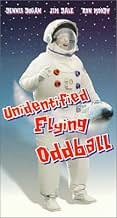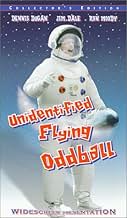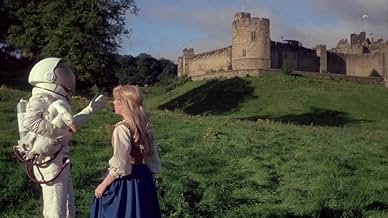ÉVALUATION IMDb
5,2/10
1,4 k
MA NOTE
Ajouter une intrigue dans votre langueAn astronaut and his android double travel back to the time of King Arthur.An astronaut and his android double travel back to the time of King Arthur.An astronaut and his android double travel back to the time of King Arthur.
John Le Mesurier
- Sir Gawain
- (as John le Mesurier)
Bruce Boa
- Air Force Officer
- (uncredited)
Al Lampert
- NASA Technician
- (uncredited)
Derek Suthern
- NASA VIP
- (uncredited)
Histoire
Le saviez-vous
- AnecdotesThe Stardust ship prop now resides in a very old fairground/theme park called Blackgang Chine on the Isle of Wight in the UK. Visitors used to be able to explore the interior, but is now off-limits except to look at from the outside.
- GaffesWhen Tom is flying during the battle scene near the end, wires that are holding the jet are clearly visible in several shots.
- Citations
Hermes: [Discussing Sandie at film's end] What on earth are you going to do with her?
Tom Trimble: You mean what am I going to do with her on Earth? Live happily ever after. Isn't that what you're supposed to do in a situation like this?
- ConnexionsEdited into Disneyland: The Spaceman and King Arthur: Part 1 (1982)
Commentaire en vedette
Based on the ratings and reviews, this movie seems to have a problem with expectation management. It's a Disney movie, but its production standards aren't as uniformly high as one might expect. Apparently they had to cut some corners. This film came out 2 years after La guerre des étoiles (1977), but its special effects aren't far above Patrouille du cosmos (1966) in quality. Also there is something odd about the plot that suggests late changes. (Someone just disappears, suggesting that he died, and is never mourned.)
Some reviewers complain about a lack of realism. I think they are really missing the point. This kind of movie doesn't have to be realistic. The original novel is basically an extended joke, and so is this film. What matters is whether it is a good joke and whether it follows the internal logic of fiction. On these accounts its actually a really good movie.
LONG DIGRESSION ON LANGUAGE
In his novel A Connecticut Yankee at King Arthur's Court, Mark Twain dates King Arthur (who likely wasn't a historical person) in the 6th century, and so does this film, which is very loosely based on the book. To get an idea of how long ago that was:
What we think of as England today wasn't a country yet but a region consisting of many small countries. The Romans had left in the early 5th century, and Anglo-Saxons from the North Sea coast of Germany, Denmark and the Netherlands were coming to England, bringing with them the Germanic dialects that would soon develop into Old English (also called Anglo-Saxon). But at the time of the film's setting we don't even call that language Old English yet because that name is preserved for the earliest form preserved in writing. It wasn't before the following century, the 7th century, that England became mostly Christian and the earliest preserved texts in Old English were written.
Here is what the Lord's Prayer looked like in 995, over 400 years AFTER the supposed time of King Arthur:
Fæder uure / þuu þee eart on heofonum / Sii þiin nama gehaalgod / Too becume þiin rice / Gewurþe þiin willa / On erðon swaa swaa on heofonum / ...
Mark Twain would have had a hard time writing in this language, and his readers wouldn't have understood him. Even Middle English was too antiquated for his purposes. Here is the same text in a Middle English version from 1389:
Oure fadir / That art in hevenes / Halwid be thi name / Thi kingdom come to / Be thi wille don / On erthe as in hevenes / ...
Much better, but still too antiquated. So Mark Twain used the English of Shakespeare and the original King James Bible: Early Modern English. And so do most film adaptations. Only, they almost invariably get the grammar wrong. Which is very jarring to speakers of other Germanic languages, who tend to have a better feel for Early Modern English grammar than most native English speakers. Anyway, here is a correct version from 1611 in Early Modern English, taken from the King James Bible:
Our father which art in heauen, / hallowed be thy name / Thy kingdome come. / Thy will be done, / in earth, as it is in heauen. / ...
I am glad that this film generally doesn't even try to use Early Modern English in the dialogs, leaving only a few instances of the usual wrong grammar and making the dialogs flow better.
END OF DIGRESSION.
Of course the time travel aspect (and in fact also the space travel aspect) isn't realistic either. And doesn't have to be. All that matters is that it follows its own internal logic. Which it does.
The film's plot makes good use of the idea of an astronaut arriving at King Arthur's court rather than a distant planet. Unfortunately it overdoes the special effects, which are not its strength, and doesn't make as much use of its excellent actors as it could have done. But overall it's great fun if you are prepared to be entertained.
Some reviewers complain about a lack of realism. I think they are really missing the point. This kind of movie doesn't have to be realistic. The original novel is basically an extended joke, and so is this film. What matters is whether it is a good joke and whether it follows the internal logic of fiction. On these accounts its actually a really good movie.
LONG DIGRESSION ON LANGUAGE
In his novel A Connecticut Yankee at King Arthur's Court, Mark Twain dates King Arthur (who likely wasn't a historical person) in the 6th century, and so does this film, which is very loosely based on the book. To get an idea of how long ago that was:
What we think of as England today wasn't a country yet but a region consisting of many small countries. The Romans had left in the early 5th century, and Anglo-Saxons from the North Sea coast of Germany, Denmark and the Netherlands were coming to England, bringing with them the Germanic dialects that would soon develop into Old English (also called Anglo-Saxon). But at the time of the film's setting we don't even call that language Old English yet because that name is preserved for the earliest form preserved in writing. It wasn't before the following century, the 7th century, that England became mostly Christian and the earliest preserved texts in Old English were written.
Here is what the Lord's Prayer looked like in 995, over 400 years AFTER the supposed time of King Arthur:
Fæder uure / þuu þee eart on heofonum / Sii þiin nama gehaalgod / Too becume þiin rice / Gewurþe þiin willa / On erðon swaa swaa on heofonum / ...
Mark Twain would have had a hard time writing in this language, and his readers wouldn't have understood him. Even Middle English was too antiquated for his purposes. Here is the same text in a Middle English version from 1389:
Oure fadir / That art in hevenes / Halwid be thi name / Thi kingdom come to / Be thi wille don / On erthe as in hevenes / ...
Much better, but still too antiquated. So Mark Twain used the English of Shakespeare and the original King James Bible: Early Modern English. And so do most film adaptations. Only, they almost invariably get the grammar wrong. Which is very jarring to speakers of other Germanic languages, who tend to have a better feel for Early Modern English grammar than most native English speakers. Anyway, here is a correct version from 1611 in Early Modern English, taken from the King James Bible:
Our father which art in heauen, / hallowed be thy name / Thy kingdome come. / Thy will be done, / in earth, as it is in heauen. / ...
I am glad that this film generally doesn't even try to use Early Modern English in the dialogs, leaving only a few instances of the usual wrong grammar and making the dialogs flow better.
END OF DIGRESSION.
Of course the time travel aspect (and in fact also the space travel aspect) isn't realistic either. And doesn't have to be. All that matters is that it follows its own internal logic. Which it does.
The film's plot makes good use of the idea of an astronaut arriving at King Arthur's court rather than a distant planet. Unfortunately it overdoes the special effects, which are not its strength, and doesn't make as much use of its excellent actors as it could have done. But overall it's great fun if you are prepared to be entertained.
- johannesaquila
- 4 nov. 2021
- Lien permanent
Meilleurs choix
Connectez-vous pour évaluer et surveiller les recommandations personnalisées
- How long is Unidentified Flying Oddball?Propulsé par Alexa
Détails
- Date de sortie
- Pays d’origine
- Site officiel
- Langue
- Aussi connu sous le nom de
- Unidentified Flying Oddball
- Lieux de tournage
- société de production
- Consultez plus de crédits d'entreprise sur IMDbPro
- Durée1 heure 33 minutes
- Rapport de forme
- 1.66 : 1
Contribuer à cette page
Suggérer une modification ou ajouter du contenu manquant

Lacune principale
By what name was The Spaceman and King Arthur (1979) officially released in India in English?
Répondre



































